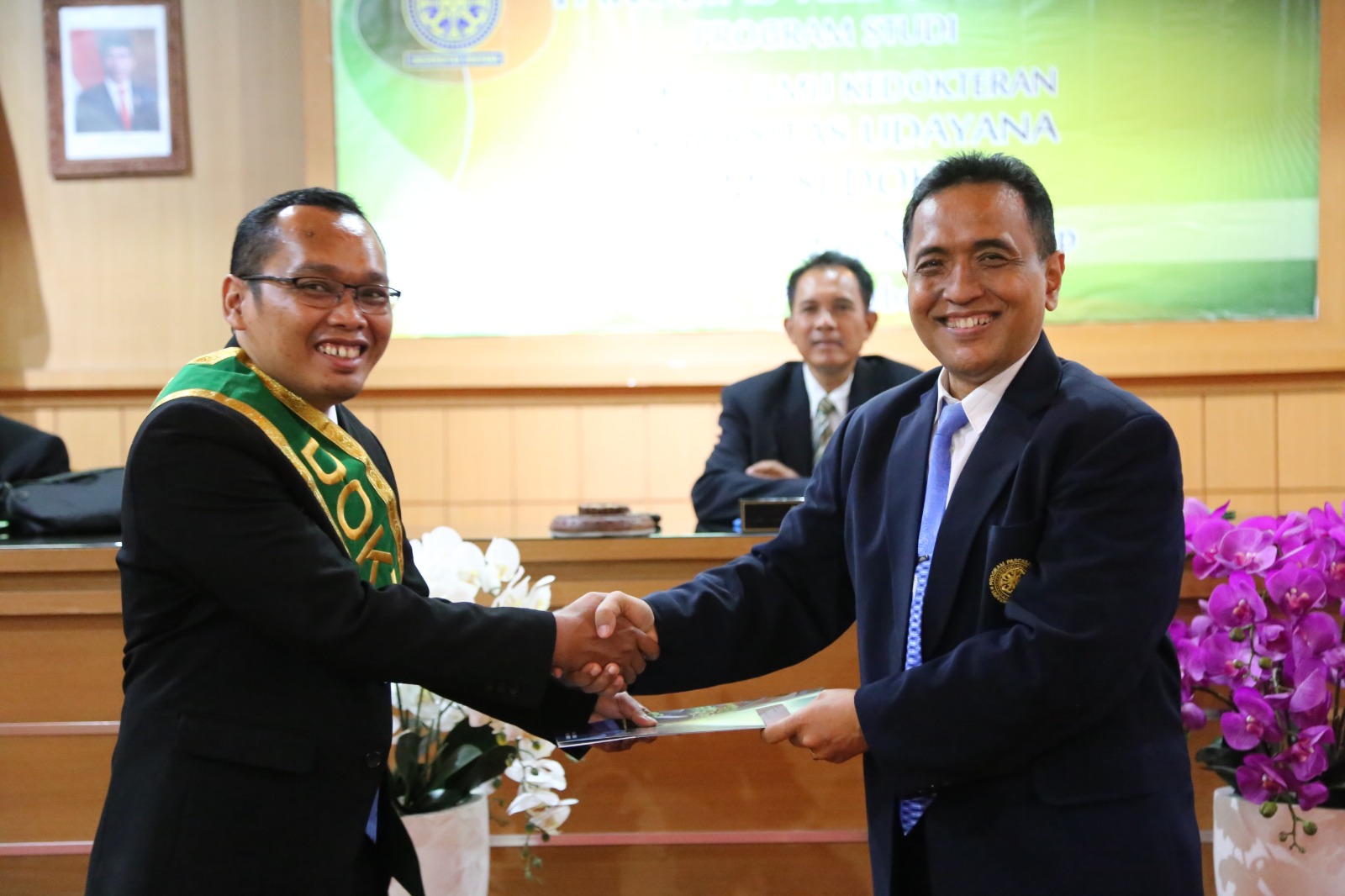Doctor of Medical Sciences Proves the Potential of Bitter Gourd Extract for Male Contraception
Doctor of Medicine Proves Potential of Bitter Gourd Extract for Male Contraception
Located in the Postgraduate Program Building Lt. III Hall Room, Denpasar Campus, a Doctoral Promotion examination was held with the promovendus candidate, Zul Hendry, S.Kep., Ners., M.Kep., with the dissertation title "Giving Bitter Gourd Fruit Extract (Momordica charantia L) Causes Lower Spermatozoa Concentration Through StAR Protein Expression and Lower Testosterone Levels and Higher Caspase-3 Expression in Mice (Mus musculus)". (17/10/2023)
One of the problems of developing countries such as Indonesia is the high rate of population growth. Therefore, the government continues to optimize family planning programs including encouraging male participation to play an active role, one of which is by providing contraceptives for men. Indonesia has various plants that have the potential as contraceptive agents, one of which is bitter melon (Momordica charantia L) which has traditionally been widely used in several Asian and African countries. Previous studies have shown that bitter melon extract has a fertility-lowering effect, but no studies have explained the mechanism by which this occurs. So far, there are 2 (two) theories regarding the pathways that may be the mechanism of action, namely hormonal mechanisms and cytotoxic mechanisms. The purpose of this study is to reveal the mechanism of decreased fertility in mice given bitter melon extract.
The results showed that the mean concentration of spermatozoa in the treatment group was significantly lower than that in the control group. StAR protein expression was lower in the treatment group than the control group. Testosterone levels were lower in the treatment group. While caspase-3 expression was significantly higher in the treatment group compared to the control group. However, in the examination of MDA levels, there was no significant difference between the two groups. In multivariate analysis using multiple linear regression, it was found that testosterone levels had the greatest effect on spermatozoa concentration.
In conclusion, the administration of bitter melon extract causes spermatozoa concentration, StAR protein expression, and testosterone levels to be lower, and caspase-3 expression to be higher. While MDA levels there is no significant difference. Suggestions for future researchers are the need for further research on other markers / markers related to the effects of bitter melon extract on fertility.
The novelty of this study is to find that the administration of bitter melon fruit extract (Momordica charantia L) causes a decrease in fertility in mice mainly through hormonal pathways, namely a decrease in StAR protein expression and testosterone levels that increase apoptosis of spermatogenic cells with an indicator of increased caspase-3. Malondialdehyde (MDA) levels did not increase indicating no increase in oxidative stress so that the possibility of the extract having a direct cytotoxic effect on spermatogenic cells was not proven.
The examination was chaired by the Vice Dean for General and Financial Affairs of FK Unud Dr. dr. I Made Sudarmaja, M.Kes., with a team of examiners:
1. Prof. Dr. dr. Bagus Komang Satriyasa, M.Repro (Promoter)
2. Prof. Dr. I Nyoman Mangku Karmaya, M.Repro., PA (K) (Copromoter I)
3. Prof. Dr. dr. Wimpie I Pangkahila, Sp.And.SubspecSAAM (Copromoter II)
4. Prof. Dr. dr. I Made Bakta, Sp.PD-KHOM
5. Prof. Dr. dr. I Made Jawi, M.Kes
6. Prof. Dr. Ir. Ida Bagus Putra Manuaba, M.Phil
7. Prof. drh. I Nyoman Mantik Astawa, Ph.D.
8. Prof. Dr. dr. I Wayan Putu Sutirta Yasa, M.Si
9. Prof. Dr. drh. Tjok Gde Oka Pemayun, MS
10. Dr. dr. I Gusti Ayu Widianti, M.Biomed
While academic invitations are :
1. Dr. dr. Desak Made Wihandani, M.Kes
2. Dr. dr. Ida Ayu Ika Wahyuniari, S.Ked., M.Kes
3. Dr. dr. I Gusti Ayu Artini, M.Sc
4. Dr. Ns. Ika Widi Astuti, S.Kep., M.Kep., Sp.Kep.Mat
5. Dr. Ns. I Gusti Ayu Ratih Agustini, M.Kes
In this exam, Dr. Zul Hendry, S.Kep., Ners., M.Kep., was declared to have passed as the 399th Doctoral Graduate of the Doctoral Degree, Faculty of Medicine, Udayana University with a Very Satisfactory predicate.









